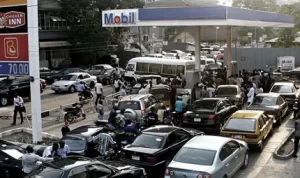
Nigerian Petroleum Industry Reacts to Subsidy Removal with Pump Price Surge and Increased Fare by Commercial TransportersDuring his inauguration speech yesterday, President Bola Tinubu made a clear declaration that “the era of petroleum subsidy is over.”
In response to the removal of subsidy on petrol, some marketers swiftly increased their prices by approximately 100 percent, raising it to N370 from the previous N185 per litre. However, a few major marketers in Lagos and Abuja opted for lower prices, selling between N195 and N220 per litre. As a result, numerous petrol stations experienced closures, leading to the formation of long queues. Depot owners also suspended operations, citing the need for further clarification regarding the implementation of the new policy.
In Abuja, motorists reacted to the subsidy removal by encountering long queues at petrol stations. Additionally, transporters promptly raised their fares in response to the developments.
As a result of the petrol subsidy removal, many commuters found themselves stranded at various bus stops, awaiting commercial buses that may have been affected by the ensuing chaos. Some of the buses that were in operation immediately hiked their fares by 50 to 100 percent due to concerns of possible fuel scarcity.
One discontented motorist, speaking with a reporter at a petrol station, expressed his frustration: “Why would Tinubu begin his tenure by punishing the already suffering and impoverished Nigerians who have endured the previous administration of President Muhammadu Buhari? This is completely unfair to Nigerians. When I heard that Tinubu had ordered the removal of oil subsidy, I rushed here to fill my tank and some jerry cans for my generator.”
Similarly, Mr. John Akinloye, a motorist in the Agege area, shared his thoughts: “I wasn’t surprised to see queues forming at the fuel stations after the announcement. I just hope this unfortunate situation won’t persist, so as to spare the suffering masses from further economic and mental anguish. I’ve been waiting at the fuel station for over an hour, and I still haven’t reached the fuel pump. Even the fuel attendants are reluctant to sell more than N3,000 worth of fuel to each buyer. They refuse to serve those wanting to purchase N4,000.”
Long queues were observed at Conoil and Adova Petroleum stations in the Karu area of the capital city, where petrol was being sold at N195 per litre.
Independent marketers, on the other hand, increased the pump price to a range between N315 and N370 per litre, with the higher prices noted outside of Lagos and Abuja.
The situation is expected to worsen in the coming days as workers and business owners resume their activities after the holiday declared for the inauguration of the new president.
Meanwhile, many stakeholders interviewed by Vanguard expressed the belief that the removal of fuel subsidy was a long overdue and necessary step.
MD of 11 Plc stated, “Fuel subsidy removal is long overdue.”
Adetunji Oyebanji, the former chairman of the Major Oil Marketers Association of Nigeria (MOMAN) and Managing Director of 11PLC, expressed his approval of the fuel subsidy removal, stating, “This is a welcome development. The country is facing continuous financial strain, and if we are not careful, our revenue will be entirely consumed by servicing debts and paying for the subsidy, leaving us with no funds for other essential matters like salaries. The opposition to this change will ultimately suffer even more. The cost of the subsidy has been extensively discussed over the years, and a significant portion is directed towards subsidizing companies outside of Nigeria, so it is necessary for it to be eliminated.”
Oyebanji emphasized that the removal of fuel subsidy was long overdue, as it primarily benefited the elite who own cars, rather than the ordinary citizens. He expressed his satisfaction with the planned removal.
Similarly, Professor Felix Amieyeofori, the Lead Promoter of EnergyHub Nigeria, supported the subsidy removal, stating, “This is a positive development for the oil and gas industry. We endorse it because the subsidy primarily benefits the elite. The government should allocate the resources used for the subsidy to other strategic economic programs. It is not feasible for us to borrow money to pay for the subsidy.”Mazi Colman Obasi, the National President of the Oil and Gas Service Providers Association of Nigeria, expressed skepticism towards the removal of fuel subsidy, referring to it as an easy means of generating money. He stated that while the idea may sound appealing in speeches, implementing such measures is often more challenging than it appears. Obasi noted that resistance can be expected when it comes to removing sources of easy financial gains, such as fuel subsidy. He further commented that past inaugural presidential speeches in Nigeria have often fallen short in delivering on their promises and hopes. Obasi concluded by suggesting a wait-and-see approach to gauge the actual implementation of the announced plans.


